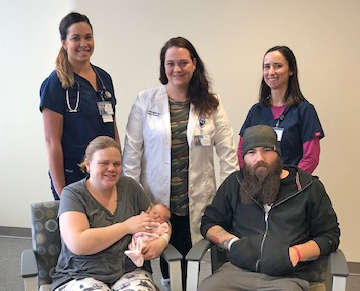
Monroe Hudson Elizabeth, daughter of Maggie and Keegan Fennell of Starbuck, was born at 8:51 p.m. on January 10th claiming the honor of being Glacial Ridge Hospital’s first baby of the year. Dr. Laura Huggins (center) had the honor of delivering Monroe, who was 6 pounds 2 ounces and 18 inches long. Her grandparents are Mark and Annette Fennell of Benson and Lowell and Jayne Hacker of Hancock. Congrats! Maggie and Keegan will be receiving celebratory gifts from local businesses for Monroe and a stroller from GRHS. Also pictured are RNs Analea Erickson (left) and Amy Fremling.

